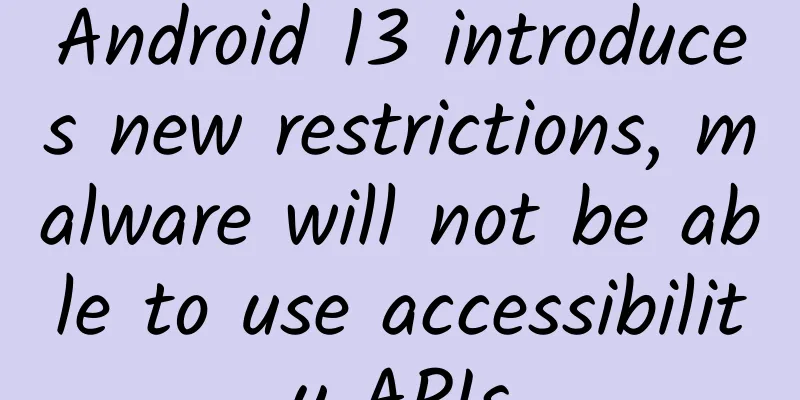Android 13 introduces new restrictions, malware will not be able to use accessibility APIs

|
The Accessibility API on Android devices is a very powerful tool. Google designed this API to allow developers to use it to build corresponding assistive applications for people with disabilities, so that people with disabilities can also use these modern devices and services conveniently. The Accessibility API allows applications to read screen content and perform input on behalf of users. Today, many screen readers and alternative input systems are using this API. But while the Accessibility API provides convenient features, it also opens the door to malicious apps that want to steal data from users. This is one reason why Google has been tightening its policies on apps using the Accessibility API. In Android 13, Google has further tightened its policies and will strictly limit user access to the Accessibility API for apps installed outside the app store. First of all, it should be pointed out that in Android 13, users can still choose to install applications from outside the Google Play Store, and the new restrictions will not make this feature disappear from Android phones. However, starting with Android 13, Google will not allow applications installed from unverified external sources to use the Accessibility API. Google did not "kill" all applications installed from external sources with one stick. This restriction does not target applications downloaded from legitimate sources (such as Google's own official app store Google Play Store, and F-Droid, which has a verified source). The latest policy only affects APK files that users obtain from untrustworthy sources. This is because applications obtained through unverified channels can disguise themselves as a benign service and use the Accessibility API to steal users' confidential data. Google stated in a statement that the new restrictions of the Android 13 system will not allow users to manually enable accessibility permissions for specific apps when such apps are restricted. In this case, if the user still chooses to grant access, the system will display an error message and prompt "For your security, this setting is currently unavailable" (as shown in the figure above). |
<<: iOS StoreKit 2 New Features Analysis
Recommend
Talk about the application of 23 design patterns in Android projects
Preface This article will discuss 23 design patte...
Please check! This is the digital annual report from 2021
Producer/ Ke Rongyi Xing Zhigang Coordinator/ He ...
Baidu to launch self-driving buses next year
Baidu has placed all its bets on artificial intel...
Zhihu recommended core logic and traffic guide!
This article studies the Zhihu platform from the ...
3 new customer acquisition cases, 3 key logics for attracting new customers!
There are many ways to attract new customers , bu...
China's new energy vehicles had a bad start in 2017 and need to improve both internally and externally to stop the bleeding
At the beginning of the new year, China's new...
With over 10 million daily active users, how does Qutoutiao operate?
As Pinduoduo went public and its stock price soar...
How to use the Golden Circle Rule to write a marketing promotion plan?
Double 11, Double 12, Christmas Eve and other fes...
Can the mini program go online without a server?
As mini programs become more and more popular (du...
The "little devil" in the water is trending again! Why are invasive golden apple snails more deadly than native snails?
Recently, golden apple snails have become a hot t...
How does APP choose marketing and promotion channels?
Q: How to choose marketing promotion channels ? A...
These cancers have a "familial" tendency, how can they be prevented?
Health has always been one of the most concerned ...
This boring conference makes people worry about Apple's future
Before the event, there was a rumor that Cook wou...
Google Glass cannot see the road ahead, where is the future heading?
[[138185]] Google Glass has captured the attentio...









